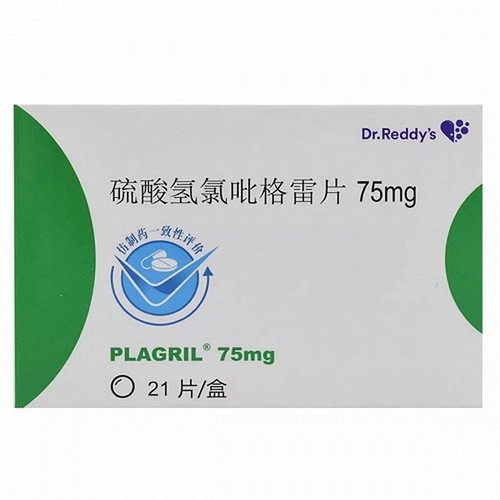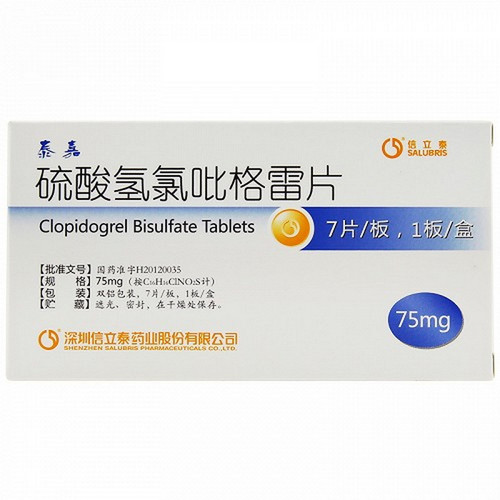Product Overview
[Drug Name]
Generic Name: Clopidogrel Bisulfate Tablets
Trade Name: Praglite (75mg Clopidogrel Bisulfate Tablets, 14 tablets)
[Main Ingredients]
Clopidogrel bisulfate.
[Indications/Main Functions]
For the prevention of atherothrombotic events in the following patients: myocardial infarction (from a few days to less than 35 days), ischemic stroke (from 7 days to less than 6 months), or patients with established peripheral arterial disease. Also for patients with acute coronary syndrome, non-ST-segment elevation acute coronary syndrome (including unstable angina or non-Q-wave myocardial infarction), including patients undergoing percutaneous coronary intervention with stent implantation, in combination with aspirin. Also for patients with ST-segment elevation acute coronary syndrome, in combination with aspirin, and can be used in conjunction with thrombolytic therapy.
[Specifications]
75mg*14 tablets
[Dosage and Administration]
Adults and Elderly: The recommended dosage for adults is 75mg orally once daily. However, depending on age, weight, and symptoms, a 50mg orally once daily dosage may be used, with or without food. For Acute Coronary Syndrome Patients: Patients with non-ST-segment elevation acute coronary syndrome (unstable angina or non-Q-wave myocardial infarction) should begin with a single loading dose of clopidogrel 300mg, followed by a continuous dose of 75mg once daily (in combination with aspirin 75mg-325mg/day). Due to the increased risk of bleeding with higher doses of aspirin, the recommended aspirin dose should not exceed 100mg. The optimal duration of treatment has not yet been formally determined. Clinical trial data support a 12-month course of treatment, with maximal efficacy observed after 3 months. ST-segment elevation acute myocardial infarction: Start with a single loading dose of clopidogrel 300 mg, followed by 75 mg once daily, with aspirin, with or without a thrombolytic agent. Do not use a clopidogrel loading dose in patients over 75 years of age. Combination therapy should be started as soon as possible after symptom onset and continued for at least 4 weeks. Studies have not confirmed the benefit of combined clopidogrel and aspirin for more than 4 weeks. Children and Adolescents: There is no experience with its use in children.
[Adverse Reactions]
Gastrointestinal reactions (such as abdominal pain, dyspepsia, constipation, or diarrhea), rash, mucocutaneous bleeding, and rarely leukopenia and agranulocytosis have been reported.
[Contraindications]
1. Clopidogrel bisulfate tablets are contraindicated in patients with hypersensitivity to the active substance or any of the ingredients. 2. Severe liver impairment. 3. Active pathological bleeding, such as peptic ulcer or pathological bleeding. 4. Breastfeeding.
[Precautions]
Due to the risk of bleeding and hematologic adverse reactions, blood counts and/or other appropriate tests should be performed promptly if clinical symptoms of bleeding occur during treatment. As with other antiplatelet agents, clopidogrel should be used with caution in patients at increased risk of bleeding due to trauma, surgery, or other pathological conditions, as well as in patients receiving aspirin, nonsteroidal anti-inflammatory drugs, heparin, platelet glycoprotein Ib/шa (GPIb/шa) antagonists, or thrombolytics. Patients should be closely monitored for any signs of bleeding, including occult bleeding, particularly during the initial weeks of treatment and/or after cardiac intervention or surgery. Coadministration of clopidogrel with warfarin is not recommended due to the potential for exacerbating bleeding. In patients undergoing elective surgery, if antiplatelet therapy is not essential, clopidogrel should be discontinued for at least 7 days prior to surgery. Clopidogrel prolongs bleeding time and should be used with caution in patients with bleeding disorders (particularly gastrointestinal and intraocular diseases). Patients should be informed that bleeding may take longer than usual to stop while taking clopidogrel (alone or with aspirin) and should report unusual bleeding events (location and duration) to their physician. Patients should inform their physician that they are taking clopidogrel before any scheduled surgery or taking any new medications. Thrombotic thrombocytopenic purpura (TTP) can rarely occur after clopidogrel use, sometimes occurring shortly after initiation. It is characterized by thrombocytopenia, microangiopathic hemolytic anemia, and associated neurological manifestations, renal impairment, or fever. TTP can be life-threatening and requires immediate emergency treatment, including plasma exchange. Due to a lack of research data, clopidogrel is not recommended for patients with acute ischemic stroke (within 7 days). Experience with clopidogrel in patients with renal impairment is limited; therefore, clopidogrel should be used with caution in these patients. Clopidogrel bisulfate tablets should be used with caution in patients with moderate liver disease who may have a bleeding diathesis, given limited experience with clopidogrel in this setting. Patients with the rare hereditary diseases galactose intolerance, Lapp lactase deficiency, or glucose-galactose malabsorption should not use this medicine. No effects on driving or operating machinery have been observed after taking clopidogrel.








